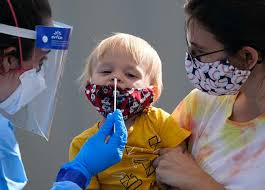What to Do If Your Child Gets COVID-19?
While the endorsement of the Covid Symptoms In Kids ages 5 and up has brought help for stressed guardians the nation over, there’s still a lot of justification behind concern. As numerous understudies the nation over have gotten back to face to face learning, cases are spreading among kids.
Other than being concerned for a youngster’s wellbeing, guardians may likewise confront disarray as rules change across school locale and some even contrast from the CDC’s direction. Yet, you can in any case keep an overall arrangement of rules for dealing with your kid, giving a valiant effort to adjust it to your school’s suggestions.
We talked with pediatric irresistible sickness master Frank Esper, MD, to get the most recent on what to do on the off chance that your kid tests positive for COVID-19.
Steps to follow assuming that your youngster has COVID-19:
Moving CDC rules and your school’s particular principles can be precarious, Dr. Esper recognizes. In any case, he adds, the CDC’s blueprint gives a decent base of decides to follow and that guardians can generally decide to do more to secure their youngsters in case they want to.
Quarantine versus detachment:
Maybe the main thing is to comprehend the contrast among isolation and separation, particularly concerning your school’s arrangement. “Quarantine is for when you’ve been uncovered, however you’re not debilitated while detachment is for when you’re wiped out,” clarifies Dr. Esper.
In case your kid shows side effects of Covid Symptoms In Kids, they should isolate and get tried as quickly as time permits, Dr. Esper suggests. Assuming they test positive, they ought to be detached to forestall likely spread through the remainder of the family.
Obviously, regardless of whether your youngster tests negative for COVID-19 in the wake of showing specific side effects, other normal adolescence respiratory infections could be dependable (flu, RSV), which implies they should remain at home from school in any case.
Close contact
Many schools utilize some type of contact following, here and there in organization with neighborhood wellbeing offices, to caution guardians when their kid has been in close contact with a positive classmate for COVID-19. So how could you continue assuming your kid is found to have been in close contact? It depends, says Dr. Esper.
“On the off chance that your kid was uncovered and is showing side effects, they ought to be isolated and tried,” Dr. Esper says.
Assuming your youngster was uncovered however immunized, the CDC says there’s no compelling reason to isolation. All things being equal, they can keep going to face to face school yet should wear a veil (many schools as of now require covers) and get tried five to seven days after the contact.
However, on the off chance that your youngster is unvaccinated and uncovered, the CDC suggests a 14-day quarantine. The CDC has choices to conceivably abbreviate that quarantine period when joined with testing yet that strategy might change from one school to another.
He adds that there ought to be no necessity for a negative test to return since it’s feasible to test positive for Covid Symptoms In Kids long after manifestations have passed and you are presently not infectious. “These tests, particularly the PCR atomic tests, are exceptionally delicate. They can return a positive outcome since it’s distinguishing the leftovers of an old disease,” he says.
Also, he says it’s typical for certain indications to wait well after an individual is as of now not infectious. “Hacking and surprisingly the deficiency of taste and smell can keep going for quite a long time,” he says. “However long there’s a generally speaking checked improvement following 10 days, they ought to be OK to get back to class. In the event that there’s no improvement, their segregation ought to most likely be broadened.”
Coronavirus side effects to look for in kids Very much like with grown-up cases, a few youngsters with COVID-19 might encounter indications while others might stay asymptomatic for the length of their ailment. Covid Symptoms In Kids are basically the same as those in grown-ups, says Dr. Esper.
The essential indications to be keeping watch for include:
- Fever or chills.
Hack.
Short breath or trouble relaxing.
Achiness.
Exhaustion.
Loss of smell or taste.
Sore throat.
Gastrointestinal trouble. Dr. Esper says that gastrointestinal trouble like queasiness or looseness of the bowels is a more conspicuous COVID-19 side effect in youngsters than grown-ups.
Assuming that your kid is encountering these indications, keep them home from school and consider getting them tried for COVID-19 as it tends to be hard for kids, particularly more youthful ones, to completely portray how they feel.
“At the point when a kid is sick, particularly more youthful kids, they don’t have the foggiest idea how to communicate how they feel or their side effects,” Dr. Esper says. “They may simply say ‘I don’t feel better,’ and highlight their stomach.”
Likewise with immunized grown-ups, inoculated kids can in any case contract COVID-19 yet these advancement cases are by and large less serious than in unvaccinated patients.
How might you treat COVID-19 manifestations in kids?
Ensure you keep your wiped out kid hydrated similarly as you would with some other respiratory disease. Lack of hydration from regurgitating or high fever can deteriorate the ailment and bring on additional difficulties.
You can likewise treat fevers, migraines and general muscle throbs with over-the-counter torment meds like Tylenol® or Motrin®. Simply make certain to utilize the fitting measurement dependent on your kid’s age.
When would it be a good idea for you to counsel your kid’s PCP?
With regards to sickness, Dr. Esper says that you shouldn’t sit tight for a particular arrangement of side effects or conditions to contact your kid’s primary care physician. In the case of something concerns you, connect.
“Each individual, each family is unique. Whether or not to call your youngster’s pediatrician about an ailment is dependent upon you,” he says. “However, for the most part, pediatricians would prefer you called than not. Your youngster’s wellbeing is critical and that is the reason there are replying mail set up so they can assist you with deciding whether your kid needs to see a specialist regardless of whether it’s late around evening time.”

